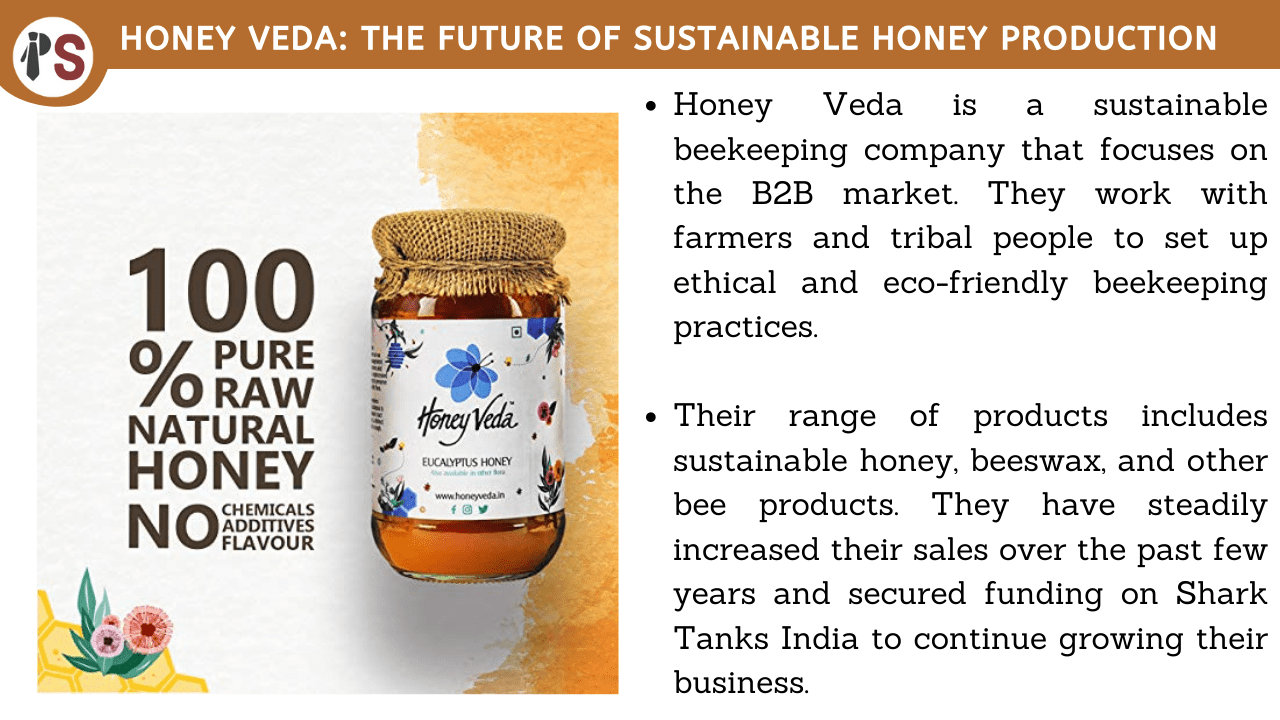
Honey Veda is a startup founded by brothers Kashyap Joshi and Hardik Joshi, both hailing from Gujarat. Hardik, who had been working in the corporate sector for nine years, became interested in beekeeping through a social activity organized by his company. He spent three years researching beekeeping and gained the confidence to leave his job and start working with beekeeping full time. Kashyap, who has 15 years of experience in pharmaceutical distribution, is the director of the company.
The idea behind the startup, Honey Veda, is to create a brand that produces beeswax, honey, and related products without harming bee hives. The founders noticed that many people tend to destroy hives with fire or smoke, which can lead to a loss of up to 80% of the hive, including baby bees and non-born honeybees. This destructive approach not only harms the bees but also contributes to the depletion of the ecosystem, as bees play a crucial role in pollination and food production.
To address this problem, Honey Veda has developed a process that allows them to harvest honey and other products without harming the hives. By doing so, they are not only contributing to the health of the environment but also promoting the well-being of bees, which are essential for pollination and, thus, for food production. They have trained over 200 farmers and tribal people in honey bee cultivation, which not only creates employment opportunities but also helps in promoting sustainable practices in beekeeping.
The aim of Honey Veda is to become the number-one company in the market and to provide high-quality, sustainable products to their customers. They are committed to promoting sustainable beekeeping practices and to ensuring that their products are ethically produced. The founders believe that their approach can revolutionize the beekeeping industry and lead to a more sustainable and eco-friendly future.
Honey Veda's commitment to sustainability and their innovative approach to beekeeping has earned them a loyal customer base. By providing high-quality, sustainable products, they are not only contributing to the health of the environment but also promoting the well-being of bees, which are essential for pollination and, thus, for food production. With their continued efforts to train more people in beekeeping and expand their product line, Honey Veda is poised for success in the future.
The business model of Honey Veda is primarily focused on the B2B (business-to-business) market. They work with farmers and tribal people to help them set up sustainable beekeeping practices and provide them with the necessary training and equipment. They also buy honey and other bee products from these farmers and use them to create their range of sustainable, eco-friendly products.
Honey Veda's products are made without harming the bees or the hives, and are ethically produced. They offer a range of products such as beeswax, honey, and related products, such as ajwain honey and mustard honey, which can be used as a healthy alternative to jam.
Their target market includes health-conscious individuals, eco-friendly consumers, and businesses that are looking for sustainable and ethically produced products. Their B2B customers include restaurants, hotels, and cafes that are interested in using their products in their menu offerings. They are also targeting international markets for their export products, such as mustard honey, which they believe has the potential to replace jam in the future.
Honey Veda is a seasonal business that operates for 9 to 10 months a year. In the fiscal year 2020-2021, their sales were 35 lakhs rupees. However, in the following fiscal year, their sales increased to 51 lakhs rupees, and as of now, in the current fiscal year 2022-2023, their sales have increased to 53 lakhs rupees. Out of this, 40 lakhs counts for B2B honey-selling, 9 lakhs count for honey bees, and 4 lakhs for retail.
Honey Veda's plan of action if they receive funding includes increasing their bee colonies from 600 to 1500 to achieve economies of scale, rationalizing costing, and improving their margin. The B2B gross margin is currently 25%.
It is worth noting that the sales figures provided indicate a steady increase in revenue for Honey Veda over the past few years, which suggests that their business model is successful. Additionally, the fact that their B2B honey-selling accounts for a significant portion of their revenue suggests that they have been successful in establishing relationships with their B2B customers and are meeting their needs.
Honey Veda pitched in Shark Tanks India and asked for 75 lakhs rupees in exchange for 7.5% equity in the company. After negotiations, Anupam and Vineeta offered 50 lakhs for 20% equity and 25 lakhs rupees debt at 12% interest. However, Honey Veda countered with an offer of 50 lakhs for 15% equity and 25 lakhs rupees debt with a slightly lower interest rate.
Ultimately, Honey Veda's final deal was with Anupam and Vineeta for 50 lakhs rupees in exchange for 20% equity in the company and 25 lakhs rupees debt at 12% interest. While they did have to give up a larger percentage of equity than they initially asked for, they were able to secure the funding they needed to continue growing their business.
Overall, appearing on Shark Tanks India and securing a deal with Anupam and Vineeta could be seen as a significant milestone for Honey Veda. The exposure and investment gained through the show could help them expand their reach and increase their revenue in the future.
At Professional Saathi, we offer a range of business consultancy services that help businesses improve their performance, achieve growth, and overcome challenges.
Copyright 2026 © Created By KTPG PROFESSIONAL SAATHI CORPORATE CONSULTANT PRIVATE LIMITED, All Rights Reserved.
Leave Your Comment